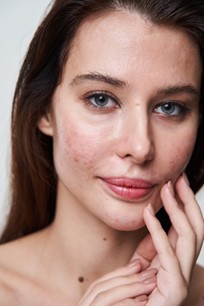Acne is a common skin condition that affects millions of people worldwide, typically manifesting as pimples, blackheads, whiteheads, and in severe cases, cysts, and nodules. While it predominantly affects adolescents during puberty, acne can persist into adulthood and varies widely in severity and type. Dr. Richard Hatfield, MD explains the causes, treatment options, and prevention strategies for acne is essential for effectively managing this condition and achieving clearer skin.
Types of Acne
Acne can be broadly categorized into several types based on its appearance and underlying causes:
Comedonal Acne: This type of acne involves blackheads and whiteheads. Blackheads form when hair follicles become clogged with oil and dead skin cells, which oxidize and turn black upon exposure to air. Whiteheads occur when follicles are blocked by oil and skin cells beneath the skin’s surface.
Inflammatory Acne: Inflammatory acne includes papules (small red bumps), pustules (pimples containing pus), nodules (large, painful lumps beneath the surface), and cysts (deep, painful, pus-filled lumps). Inflammation occurs when the follicle wall ruptures, causing immune system responses and infection.
Hormonal Acne: Fluctuations in hormone levels, particularly androgens like testosterone, can stimulate the production of excess oil (sebum) in the skin. This excess oil combines with dead skin cells and bacteria to clog pores and trigger acne outbreaks. Hormonal acne often appears along the jawline, chin, and neck.
Bacterial Acne: The bacterium Propionibacterium acnes (P. acnes) plays a role in acne development. This bacterium thrives in clogged hair follicles, producing inflammation and contributing to acne severity.
Effective Treatment Options
Treatment for acne aims to reduce oil production, speed up skin cell turnover, fight bacterial infection, and reduce inflammation. Effective treatment options include:
Topical Treatments: Over-the-counter (OTC) and prescription creams, gels, and lotions containing ingredients like benzoyl peroxide, salicylic acid, retinoids (like tretinoin), and antibiotics can help unclog pores, reduce inflammation, and kill bacteria.
Oral Medications: Antibiotics (such as doxycycline or minocycline) and oral contraceptives (for hormonal acne in females) can be prescribed to reduce inflammation and control hormonal fluctuations contributing to acne.
Isotretinoin (Accutane): Reserved for severe nodular acne, isotretinoin is a powerful oral medication that reduces sebum production, prevents clogged pores, and has long-term effects in treating acne. It requires close monitoring due to potential side effects.
Procedural Treatments: Dermatologists may recommend procedures like chemical peels, laser therapy, or extraction of comedones to improve skin texture, reduce acne scars, and prevent future outbreaks.

Tips for Preventing Breakouts
Preventing acne involves adopting healthy skincare habits and making lifestyle adjustments to minimize triggers:
- Cleanse Gently: Use a mild cleanser twice daily to remove excess oil, dirt, and makeup without stripping the skin of natural oils.
- Moisturize: Use a non-comedogenic moisturizer to keep the skin hydrated without clogging pores.
- Avoid Touching Your Face: Touching or picking at acne lesions can worsen inflammation and lead to scarring. Keep hands away from the face.
- Manage Stress: Stress can exacerbate hormonal acne. Practice stress-reducing techniques like yoga, meditation, or deep breathing exercises.
- Healthy Diet: Limit sugary foods and dairy, which may contribute to acne. Instead, opt for a balanced diet rich in fruits, vegetables, whole grains, and lean proteins.
- Hydrate: Drink plenty of water to flush toxins from the body and keep skin hydrated.
- Sun Protection: Use a broad-spectrum sunscreen with SPF 30 or higher to protect acne-prone skin from UV damage, which can worsen acne scars.
Understanding acne, its causes, treatment options, and prevention strategies empowers individuals to take proactive steps toward clearer, healthier skin. While managing acne may require patience and persistence, consulting with a dermatologist can provide personalized guidance and treatment plans tailored to individual skin types and acne severity. By combining effective skincare routines with lifestyle modifications, individuals can effectively manage acne and maintain skin health over the long term.
